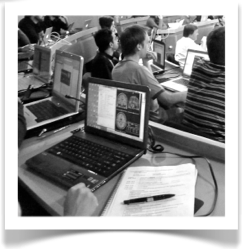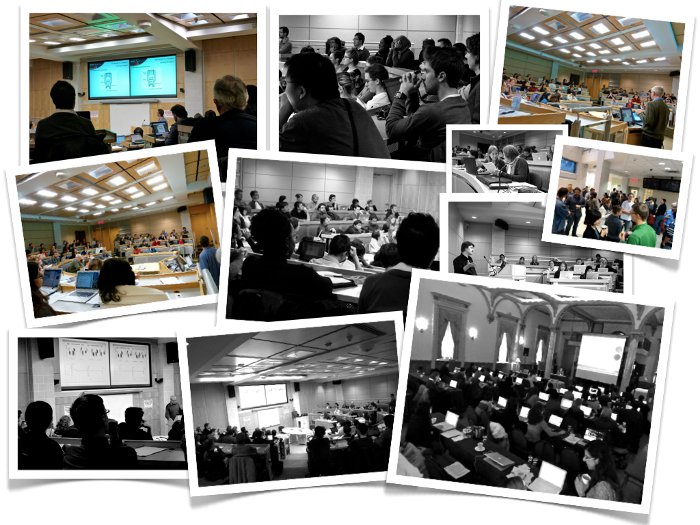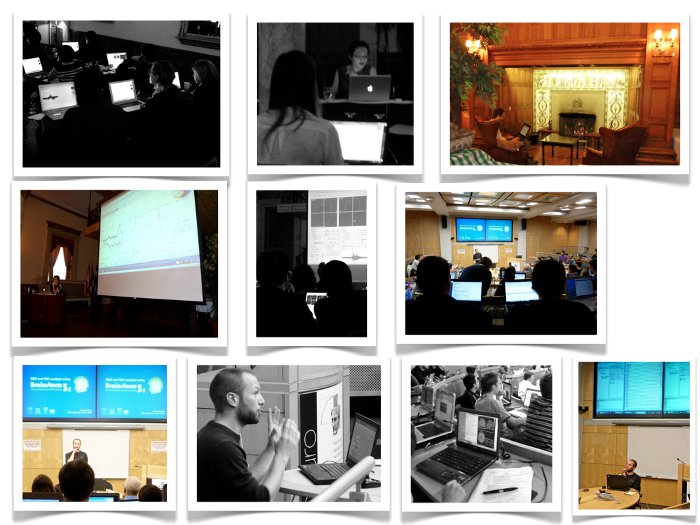|
Size: 24
Comment:
|
Size: 2437
Comment:
|
| Deletions are marked like this. | Additions are marked like this. |
| Line 1: | Line 1: |
| Training opportunities | = Brainstorm courses = {{attachment:brainstorm_training.png||width="150px",align="right"}} The best way to learn how to use Brainstorm, like any other academic software, is to benefit from local experts. However, you may be the first one in your institution to consider using Brainstorm for your research. We are happy to provide comprehensive [[Tutorials|online documentation]] and support through [[http://neuroimage.usc.edu/forums|our forum]] but there is nothing better than a course to make your learning curve steeper.<<BR>> We organize courses for institutions who are willing to develop a user community for Brainstorm. Please [[http://www.bic.mni.mcgill.ca/PeopleFaculty/BailletSylvain|contact us]] to get your started locally. More information on upcoming training sessions at :<<BR>> [[http://www.facebook.com/BrainstormSoftware|facebook.com/BrainstormSoftware]] == Upcoming and past Brainstorm courses == === McGovern Institute for Brain Research at MIT (April 28, 2012) === [[http://mcgovern.mit.edu/|{{attachment:McGovernMIT.png|http://mcgovern.mit.edu/|height="80"}}]] The Brainstorm course will immediately follow (Saturday, April 28, 2012) the MIT !McGovern Institute Symposium on ‘Magnetoencephalography: Applications to Cognitive Neuroscience”, which will be held on Friday, April 27, 2012. [[http://mcgovern.mit.edu/component/content/article/21-events/538-brainstorm-training-workshop-at-mit|Program and registration]] === Montreal Neurological Institute, McGill University (November 19, 2011) === 70 participants from around Canada gathered at the Montreal Neurological Institute (Nov 17-19, 2011) for a series of lectures and practical training on MEG acquisition, data analysis, imaging and a hands-on Brainstorm course. We have received [[http://www.canada-meg-consortium.org/EN/WorkshopPictures|great and positive feedback]] from our attendees, and we are glad the meeting has met its primary objectives of providing scientists with a first technical exposure to time-resolved brain exploration and imaging with MEG and Brainstorm. The meeting was initiated by the [[http://www.canada-meg-consortium.org|Canada MEG Consortium]]. More pictures are available on the [[http://www.bic.mni.mcgill.ca/Facilities/MEG|MEG@McGill]] group [[http://www.facebook.com/pages/MEG-at-McGill/296866506997465|Facebook page]]. {{attachment:workshop01.jpg}} {{attachment:workshop02.jpg}} |
Brainstorm courses
 The best way to learn how to use Brainstorm, like any other academic software, is to benefit from local experts. However, you may be the first one in your institution to consider using Brainstorm for your research. We are happy to provide comprehensive online documentation and support through our forum but there is nothing better than a course to make your learning curve steeper.
The best way to learn how to use Brainstorm, like any other academic software, is to benefit from local experts. However, you may be the first one in your institution to consider using Brainstorm for your research. We are happy to provide comprehensive online documentation and support through our forum but there is nothing better than a course to make your learning curve steeper.
We organize courses for institutions who are willing to develop a user community for Brainstorm. Please contact us to get your started locally.
More information on upcoming training sessions at :
facebook.com/BrainstormSoftware
Upcoming and past Brainstorm courses
McGovern Institute for Brain Research at MIT (April 28, 2012)
The Brainstorm course will immediately follow (Saturday, April 28, 2012) the MIT McGovern Institute Symposium on ‘Magnetoencephalography: Applications to Cognitive Neuroscience”, which will be held on Friday, April 27, 2012.
Montreal Neurological Institute, McGill University (November 19, 2011)
70 participants from around Canada gathered at the Montreal Neurological Institute (Nov 17-19, 2011) for a series of lectures and practical training on MEG acquisition, data analysis, imaging and a hands-on Brainstorm course. We have received great and positive feedback from our attendees, and we are glad the meeting has met its primary objectives of providing scientists with a first technical exposure to time-resolved brain exploration and imaging with MEG and Brainstorm.
The meeting was initiated by the Canada MEG Consortium.
More pictures are available on the MEG@McGill group Facebook page.



